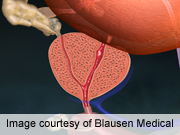
WEDNESDAY, Aug. 15 (HealthDay News) — A new investigational drug known as enzalutamide adds an average of five months to the lives of men with advanced prostate cancer, a new study has found.
This is such a significant finding that the trial was stopped early so men receiving a placebo could opt to take enzalutamide.
“We found a hormonal drug prolongs the lives of men who have failed traditional hormones as well as chemotherapy,” said lead researcher Dr. Howard Scher, chief of the genitourinary oncology service at Memorial Sloan-Kettering Cancer Center in New York City.
In addition, these results show that even after failing regular hormone therapy these tumors can still react to a hormone-based treatment, he said.
Scher said he believes enzalutamide might be even more effective if used in men with earlier stages of prostate cancer. Trials testing that theory are under way, he said.
One of the reasons for testing the drug in late-stage cancer is to speed U.S. Food and Drug Administration approval, Scher said.
The results of the study were published online Aug. 15 in the New England Journal of Medicine.
In this phase 3 trial, nearly 1,200 men with advanced prostate cancer were randomly selected to take either enzalutamide, which is taken orally, or a placebo. The men had already undergone chemotherapy, the researchers noted.
Compared to those on placebo, men taking enzalutamide lived an average of nearly five months longer and their risk of dying was reduced by 37 percent, the researchers found.
The drug is not without side effects, however, the most serious of which were seizures.
“[Seizures] occurred in five of the 800 patients who received the drug,” Scher said. Many of these patients had factors making them susceptible to seizures, he said.
Enzalutamide patients also reported hot flashes, fatigue and diarrhea.
Whether the drug will cause side effects like those seen with regular hormone therapy isn’t yet known, Scher said. That’s something the current trials may reveal.
The possible side effects can reduce patient’s quality of life and include constipation or diarrhea, nausea, loss of or decrease in appetite, dizziness or headache, trouble sleeping, impotence, and decreased sex drive.
Enzalutamide is a type of hormonal therapy that, through another pathway, acts like traditional hormone therapy. It was created to help men who develop resistance to regular hormone therapy and go on to develop an aggressive cancer called castration-resistant prostate cancer, the most advanced form of the disease, Scher said.
Researchers found that men build resistance to hormone therapy because the tumor increases the production of androgen (a male hormone) receptors, he added.
Enzalutamide binds to androgen receptors in cancer cells, blocking the ability of these receptors to promote cancer growth, Scher explained.
If approved, enzalutamide would join a similar drug, abiraterone (Zytiga), as a new treatment for prostate cancer that is resistant to traditional hormone therapy.
Although it is too early to know how much enzalutamide will cost, the wholesale cost of abiraterone is about $5,000 a month, according to Bloomberg News. The retail cost is, of course, higher.
“This is good news for men with advanced prostate cancer,” said Dr. Anthony D’Amico, chief of radiation oncology at Brigham and Women’s Hospital in Boston.
“It’s likely a drug that will be FDA approved,” he said.
D’Amico cautioned, however, that if the drug is used in men with early prostate cancer who are prone to seizures, it needs to be carefully monitored.
“The bottom line is, it’s good news,” D’Amico said. “I predict in the next five to seven years we will be using drugs like this as opposed to what we currently use to treat men with earlier-stage disease.”
More information
To learn more about prostate cancer, visit the American Cancer Society.

